 |
Previous Issues |
| Cedar Mill Community Website |
|
Search the Cedar Mill News: |
About The Cedar Mill News |
|
|||||||
| Volume 15, Issue 9 | September 2017 |
||||||
Featured Business
|
||||||||||||||
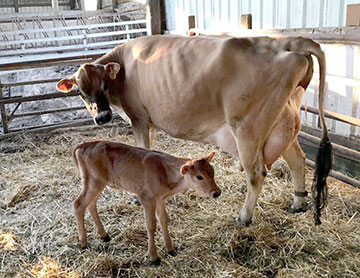 |
When I first started enjoying the fresh milk from Schoch Dairy, I didn’t want to tell anyone about it, because of the limited supply. The family was only able to sell milk from two cows, because they didn’t have a licensed processing facility. The milk came in half-gallon canning jars, and was available from a refrigerator in the garage. It was so delicious that it was worth the pleasant drive to Helvetia, even if the fridge turned out to be empty!
But after a successful Kickstarter campaign in 2015, they were able to obtain a vat pasteurizer and a bottling machine. The herd is now up to about 35 cows, and their milk is available in a small shop next to the bottling room. It’s also now in several area stores and co-ops.
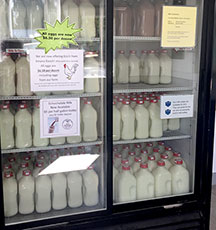 |
| The dairy case is an honor system. Leave cash in the jar and take your delicious milk! |
Dave Schoch (pronounced shock) grew up on his family farm in Helvetia. Dave’s father Hans Schoch III immigrated to the United States in 1955 from Switzerland. After working with his Swiss uncles in Salinas, California for a while, he married Sally and purchased a 78-acre dairy in Helvetia, Oregon. They ran a conventional dairy, selling milk to the Darigold cooperative from their 200-cow herd.
Dave went off to college and became a mechanical engineer. He and Casey had met in middle school in Hillsboro, were high school sweethearts, and married after they had both graduated from college. When they learned that Dave’s folks were thinking of selling the farm, they decided to return to Oregon and work with them to keep it going.
For several years they continued with Darigold, but low milk prices, plus the stress and expense of running an intensive dairy operation, led them to consider their options.
“Dave would bring in some of the milk, and I’d process it in a countertop pasteurizer for our boys,” said Casey. “They loved the flavor, and so did their friends. That’s when we started thinking about running our own business to make it available to local customers.”
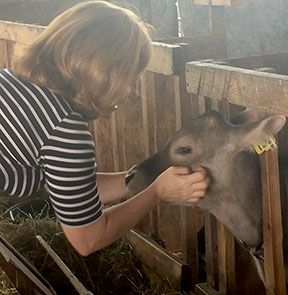 |
| Casey Schoch and one of this summer's calves. Cows are sociable animals and seem to like attention! |
Dave’s mechanical engineering expertise was useful in restoring and assembling the processing system. He purchased a vintage 1950’s bottling machine and a ‘60s pasteurizing vat from Craigslist. “It’s hard to find this equipment any more,” he explained. “The steel is valuable, so a lot of it just gets recycled. But there’s also growing interest in smaller dairy operations, so the equipment is more in demand.” After hauling the machines from California, “we had a stainless-steel expert come in and help us put it all together.”
The Schochs use vat pasteurization, which heats milk for 30 minutes at lower temperatures than the traditional method of heating it for 30 seconds at really high temperatures. This means that harmful bacteria is killed, but the milk retains fresh flavor and more nutrients. However, it's not homogenized, so cream rises to the top of the bottle. You can mix the milk again by shaking the bottle before pouring. They do not sell raw, unpasteurized milk.
One factor that helped the family decide to move forward with their plan was the conclusion of Metro’s Urban & Rural Reserve process, which put their land into the Rural Reserve, ensuring they could continue farming for at least 50 years. The nearby Urban Reserve area at the southeast corner of Helvetia Road and West Union could end up becoming housing, commercial or industrial land. Casey says, “It is kind of a mixed blessing, in that it is concerning to us that development is creeping closer and closer, and at the same time it is very convenient for our customers to drive out to us because we are so close to the urban areas of Hillsboro and Beaverton.”
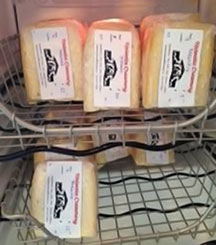 |
Dave’s parents were actively involved until recently, but they’re both in their 80s and not in the best health. They continue to live in the large farmhouse on the property.
Dave and Casey’s four sons all work on the farm. Casey says, “They earn money for college, and they usually earn a small amount to spend on whatever they want. They have grown up knowing how hard their dad and grandpa work and so it seems natural to them.”
And it’s very likely that at least some of the boys will carry on with the farm. “Our oldest son Jake graduated from U of O with a degree in English last year,” says Casey. “He is our writer and is currently working on the farm and writing in his spare time. Our next son Nate will be a junior at OSU this fall and is studying animal science. He is very interested in agriculture, but not sure if he wants to be a farmer. He was considering veterinary school or an ag related career. Our high school son Sam will be a senior at Liberty this year and is interested in becoming a fireman. And Ben, our baby, will be in seventh grade and loves the farm and the cows, so who knows.”
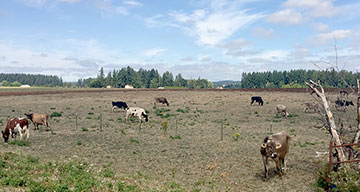 |
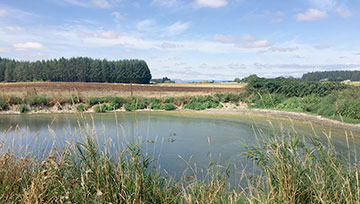 |
| A family of ducks calls the manure pond home! The liquid manure is sprayed on the fields to fertilize the grass. The clover in the distance is harvested for winter feed. The Schoch farm runs to the grove of trees. |
They breed their own calves year-round, so there are usually some pretty babies to see and pet. They get semen from a breeding service that matches their cows with bulls that would improve the herd. The family handles all the care and delivery of the calves.
They rarely need a vet because the cows are living a natural life, eating grass from spring to fall and local hay and haylage (wet hay) in the winter. The farm land is organic, but the milk is not because organic winter feed is just too expensive. Casey explains, “We don’t feed any grain, use hormones or antibiotics, except for life saving measures. We are as close to organic as possible without the certification.”
Since they opened the new facility, they’ve also been expanding both their own distribution and their offerings. Jake delivers their milk to Bales Farmington, Food Front Coop in NW Portland and Hillsdale, and several smaller co-ops and company cafeterias. They sell cheese from Helvetia Creamery, a small, family owned operation nearby. Milking three Brown Swiss cows on their Century Farm, the Grossen family makes artisan Swiss cheeses the old fashioned way. And they just recently added farm-fresh eggs from another neighboring farm, Amana Ranch, a newer farm using biodynamic methods to raise stress-free and chemical-free livestock.
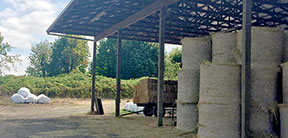 |
They recently began making “schocolate” milk, made with a mix formulated just for them. Casey says she’s experimenting with kefir, a drinkable yogurt. And she might work to offer ice cream.
Learn more about Schoch Dairy on their website, shochdairy.com, and find them on Facebook. The dairy store is located at 24335 N.W. West Union Road in Hillsboro and is open every day from 7 am to 9 pm. Head up the long driveway past the two farmhouses. Half gallons of whole milk are $4, “schocolate” is $5 and there is a $2 bottle deposit charge.
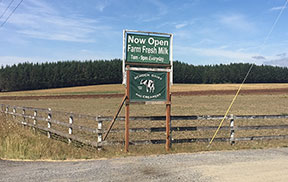 |
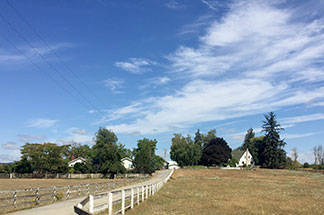 |
![]()
Like us on Facebook for timely updates
Published monthly by Pioneer Marketing & Design
Publisher/Editor:Virginia Bruce
info@cedarmillnews.com
PO Box 91061
Portland, Oregon 97291
© 2017